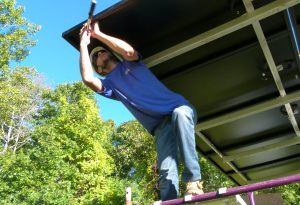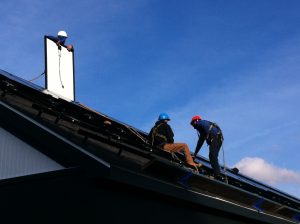Solar panels for housing are a great investment. Not only do they allow your family to save on electric bills, but they do it in a sustainable way for years to come. Generally speaking, solar panels are extremely durable and with no moving parts, they will generally require little to no maintenance.
 As of now, the average lifespan of solar panels for housing is about 25-30 years however, some systems can last for even 50! The length of their lifespan depends mostly on the weather conditions in the area you live in and quite frankly your own personal preference. Here in New England, we face tough winters, rainstorms, and even the potential of hail; a recipe for damage. In terms of personal preference, it is important to note that any panel’s efficiency decreases over time so while your solar system is unlikely to simply stop working, it will instead slowly lose efficiency, and hence its production of electricity will decrease.
As of now, the average lifespan of solar panels for housing is about 25-30 years however, some systems can last for even 50! The length of their lifespan depends mostly on the weather conditions in the area you live in and quite frankly your own personal preference. Here in New England, we face tough winters, rainstorms, and even the potential of hail; a recipe for damage. In terms of personal preference, it is important to note that any panel’s efficiency decreases over time so while your solar system is unlikely to simply stop working, it will instead slowly lose efficiency, and hence its production of electricity will decrease.
United States Department of Energy, “Most solar electric systems last 30 years and pay for themselves in 4 to 5 years after tax credits and rebates. That means homeowners can enjoy free electricity for years.” In New England, it typically takes closer to 6-8 years to pay off your system. But that is still a very short period of time in comparison to the life your solar panels can have, making it absolutely worth buying a system. Still, it’s important to understand when you might wish to replace various parts of your solar system.
Solar Panel Degradation
Over time solar panels for housing lose their efficiency to convert sunlight into electricity. Like most things, they won’t last forever. This is what we call degradation. Different solar panels have different rates of degradation depending on quality. The average degradation of solar panels falls between 0.3%-0.8% a year.
Fortunately, working with a solar installer who is knowledgeable enough to install quality components correctly can help ensure your system lasts as long as possible. But once your system’s efficiency drops significantly you may want to consider replacement so you can better meet your ongoing electricity demand. For most people, that is usually around the 80% mark – but your tolerance for less production may be different 20 to 25 years from now.
Other Parts of your Solar System
In addition to your solar panels, your inverter may need replacement before your panels are ready to go. However, depending on the type and age of the inverter you had installed originally, it should easily last 10 to 15 years, but many now can be expected to last 25. Some even offer an extended 25-year warranty. 
The racking of your solar system may also need to be replaced at some point, but that is a minimal issue unless you are aiming for keeping your panels for an extremely long period of time.
If you own a solar battery in tandem with your solar system you may also consider replacing the batteries over time. In most cases, you can replace the internal battery without replacing the system that controls it. The original batteries slide out and new ones slide back in. And if a battery is something that interested you, you can read more about our favorite battery in our blog.
Lastly, your roof is another component of your system that should also be considered for replacement. Depending on the material, roofs typically last between 25 and 35 years. That happily matches the typical system’s expected lifetime – and in fact, your roof will likely get less wear and tear with a solar system above it – but it’s definitely important to consider its condition before any new installation. Otherwise, you may have to remove your solar panels to replace your roof before the end of your system’s lifetime. It’s a cost and hassle no one wants. To learn more about when to replace your roof check out this blog post.
Ways to Extend Solar Panel Life
The best way to extend the life of your solar system is to work with a quality installer so it is installed correctly the first time. But then just treat it as you would any other important system in your home. Monitor production using the systems included with it regularly and give it a visual “once over” every month or so. Catching things like racking that has loosened or wires having been exposed early are always to your advantage. And generally, that should always be something done from the ground. It is highly unlikely you should ever have to actually get up on the roof. And in terms of cleaning your panels, it rains here in New England so again, even cleaning panels is generally unnecessary.
Choosing the right installer means quality products, workmanship, customer service, as well as providing warranties to help protect your wallet. Do your research and find the right installer that recommends the appropriate products for all your family’s needs. Read the companies testimonials, review their website, and understand the level of professionalism they have to offer.
While all solar systems will eventually need replacement, it is generally a time that will be well into the future. And if your system is already on the older side, don’t hesitate to reach out if you have questions. We’re here to help.




